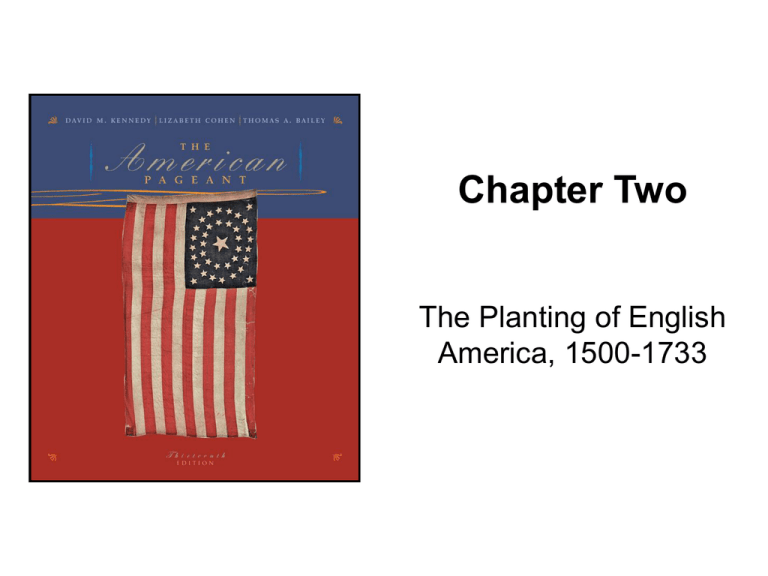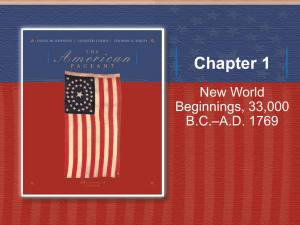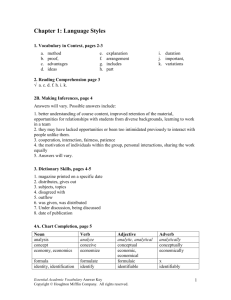
Chapter Two
The Planting of English
America, 1500-1733
Kennedy, The American Pageant
Chapter 2
The English Protestant Reformation
was first launched by
1. King Edward VI.
2. Queen Mary I.
3. King Henry VIII.
4. Queen Elizabeth I.
Copyright © Houghton Mifflin Company. All rights reserved.
2-2
Kennedy, The American Pageant
Chapter 2
The English Protestant Reformation
was first launched by
3. King Henry VIII.
Hint: See page 25.
Copyright © Houghton Mifflin Company. All rights reserved.
2-3
Kennedy, The American Pageant
Chapter 2
In 1585, Sir Walter Raleigh launched
the failed English colonial settlement
of Roanoke in present-day
1. Canada.
2. New York.
3. Massachusetts.
4. North Carolina.
Copyright © Houghton Mifflin Company. All rights reserved.
2-4
Kennedy, The American Pageant
Chapter 2
In 1585, Sir Walter Raleigh launched
the failed English colonial settlement
of Roanoke in present-day
4. North Carolina.
Hint: See page 26.
Copyright © Houghton Mifflin Company. All rights reserved.
2-5
Kennedy, The American Pageant
Chapter 2
The English law of primogeniture
contributed to colonial settlements
because
1. the enclosure of croplands drove many farmers to
seek their fortunes elsewhere.
2. ambitious younger sons were unable to inherit
property.
3. there was a growing amount of available capital
for investment in overseas ventures.
4. English Puritans no longer believed that they
could reform the Church of England.
Copyright © Houghton Mifflin Company. All rights reserved.
2-6
Kennedy, The American Pageant
Chapter 2
The English law of primogeniture
contributed to colonial settlements
because
2. ambitious younger sons were unable to inherit
property.
Hint: See page 28.
Copyright © Houghton Mifflin Company. All rights reserved.
2-7
Kennedy, The American Pageant
Chapter 2
Even though the purpose of the
Virginia Company was to earn quick
profits for stockholders, the
company’s charter guaranteed
1. that a share of the company’s profits would go to
the settlers.
2. that the settlers should look toward long-term
agricultural improvement rather than hunt for
gold.
3. that settlers would enjoy all the rights of
Englishmen that they had at home.
4. that settlers could return to England without
penalty if the colony did not work out.
Copyright © Houghton Mifflin Company. All rights reserved.
2-8
Kennedy, The American Pageant
Chapter 2
Even though the purpose of the
Virginia Company was to earn quick
profits for stockholders, the
company’s charter guaranteed
3. that settlers would enjoy all the rights of
Englishmen that they had at home.
Hint: See page 28.
Copyright © Houghton Mifflin Company. All rights reserved.
2-9
Kennedy, The American Pageant
Chapter 2
Lord de la Warr’s use of “Irish tactics”
in Virginia led to
1. the replacement of failed English settlers with
more successful colonists from Ireland.
2. Powahatan’s defeat of the Virginia army
commanded by Captain John Smith.
3. complete destruction of the Virginia’s tobacco
fields.
4. fierce raids on Indian villages and destruction of
their crops.
Copyright © Houghton Mifflin Company. All rights reserved.
2-10
Kennedy, The American Pageant
Chapter 2
Lord de la Warr’s use of “Irish tactics”
in Virginia led to
4. fierce raids on Indian villages and destruction of
their crops.
Hint: See page 30.
Copyright © Houghton Mifflin Company. All rights reserved.
2-11
Kennedy, The American Pageant
Chapter 2
The English settlers’ policy of killing
or driving out the Indians emerged
partly because
1. the English wanted to seize the Indians’ stores of
gold and silver.
2. the Indians served no economic function for the
colonists.
3. the English kings considered the Indians an
inferior race.
4. the Indians’ nomadic way of life was incompatible
with white agriculture.
Copyright © Houghton Mifflin Company. All rights reserved.
2-12
Kennedy, The American Pageant
Chapter 2
The English settlers’ policy of killing
or driving out the Indians emerged
partly because
2. the Indians served no economic function for the
colonists.
Hint: See page 30.
Copyright © Houghton Mifflin Company. All rights reserved.
2-13
Kennedy, The American Pageant
Chapter 2
During its first forty years of Virginia’s
existence, African slaves
1. had only a small presence in the colony.
2. made up a majority of the colony’s population.
3. were the cheapest form of labor available.
4. were not really owned but worked as indentured
servants for a fixed term.
Copyright © Houghton Mifflin Company. All rights reserved.
2-14
Kennedy, The American Pageant
Chapter 2
During its first forty years of Virginia’s
existence, African slaves
1. had only a small presence in the colony.
Hint: See page 33.
Copyright © Houghton Mifflin Company. All rights reserved.
2-15
Kennedy, The American Pageant
Chapter 2
The Maryland colony was originally
established as
1. King James II’s attempt to keep Virginia under
tight control
2. a refuge for English Quakers.
3. a colony to be based on white indentured labor
rather than black slavery.
4. a haven for persecuted English Catholics.
Copyright © Houghton Mifflin Company. All rights reserved.
2-16
Kennedy, The American Pageant
Chapter 2
The Maryland colony was originally
established as
4. a haven for persecuted English Catholics.
Hint: See pages 33–34.
Copyright © Houghton Mifflin Company. All rights reserved.
2-17
Kennedy, The American Pageant
Chapter 2
Maryland’s 1649 “Act of Toleration”
still contained provisions for harsh
persecution of
1. Quakers and Mennonites.
2. Indians who refused to convert to Christianity.
3. Jews and atheists.
4. Catholics who would not renounce allegiance to
the pope.
Copyright © Houghton Mifflin Company. All rights reserved.
2-18
Kennedy, The American Pageant
Chapter 2
Maryland’s 1649 “Act of Toleration”
still contained provisions for harsh
persecution of
3. Jews and atheists.
Hint: See page 34.
Copyright © Houghton Mifflin Company. All rights reserved.
2-19
Kennedy, The American Pageant
Chapter 2
Sugar cane growing contributed
greatly to the expansion of slavery
because
1. it was so much more profitable than tobacco.
2. it could only be grown on large plantations with
extensive labor.
3. only African slaves knew how to cultivate sugar
cane.
4. it provided the molasses that could be converted
to rum for the purchase of African slaves.
Copyright © Houghton Mifflin Company. All rights reserved.
2-20
Kennedy, The American Pageant
Chapter 2
Sugar cane growing contributed
greatly to the expansion of slavery
because
2. it could only be grown on large plantations with
extensive labor.
Hint: See page 34.
Copyright © Houghton Mifflin Company. All rights reserved.
2-21



